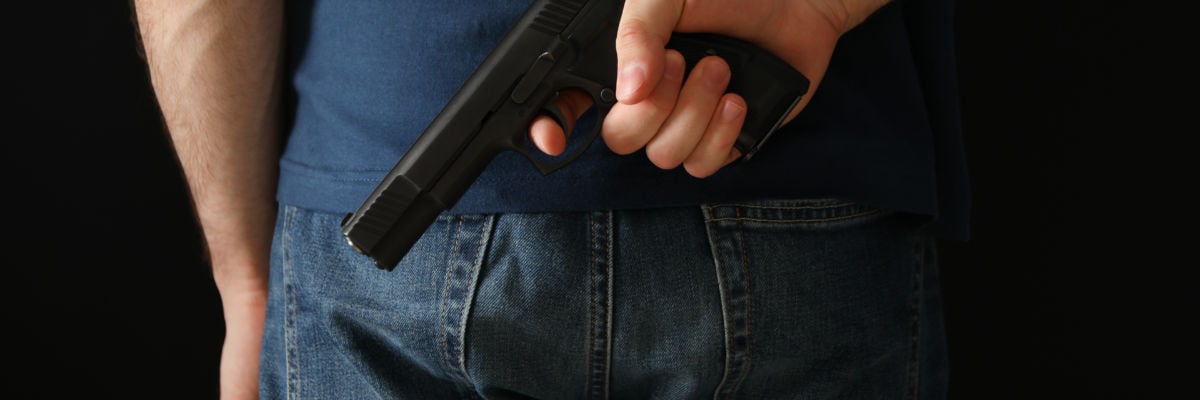
What are the morals of self-defense? Can we use lethal force against someone trying to kill us? What about to defend our property? Fr. Sebastian Walshe gives the Church’s answers these questions on Catholic Answers Live.
Caller: What does the Church actually teach about self-defense and defense of others, both for law enforcement officers and civilians?
Fr. Sebastian Walshe: Okay, that’s an excellent question. So there are two different things here: first of all, there’s just self-defense against an attacker; then there’s also the possibility of killing another in self-defense, which I suspect is part of your question—you want to know whether or not, if someone’s attacking you, it’s possible, does the Church say it’s okay to even kill someone in self-defense.
Okay. And those actually require slightly different answers there. So the Church has always taught that it’s licit—that it’s in fact morally good—to defend yourself against the physical attacker. Even if that person’s not responsible—let’s say they’re on drugs, or let’s say that they’re, you know, they’re mentally unable to make a judgment because of some impediment— nevertheless, you can defend yourself against an attacker, and you have a responsibility to preserve your own physical bodily life over theirs, okay? Now you do have a responsibility for their spiritual life over your bodily life, but we’re talking about just their bodily life and your bodily life. You have an obligation to preserve your life more even than theirs.
You could—if it’s about self-defense—you could, in order to be more conformed to Christ, willingly allow yourself or expose yourself to danger or even death for the sake of being more like unto Christ, who did not defend himself when he was unjustly condemned and executed, and we call those people martyrs. You know, you don’t have to to defend yourself, you can make that choice for yourself, and that’s an even more perfect choice, but either one is a good choice. Either one is a good thing to do.
When it comes to self-defense when, in order to stop the aggressor, you would likely have to kill them, that’s permitted so long as you do not directly intend to kill them, your intent is to stop them from attacking you. Okay? And you’re trying to do something to that effect. Only, according to St. Thomas—and the Church’s teachings are maybe not completely settled on this, or at least not clear on this, but—only in the case of a civil authority would you be able to directly intend the death of someone as a punishment, for example.
So, you know, a police officer who’s an agent of the state, he can actually intend to kill someone in order to prevent them from, you know, harming others. You, on the other hand, if you were either defending yourself or defending another, your intention would have to be to try and stop them from harming someone, because you’re not an agent of the state in a case like that. So there is a moral distinction there.
Host: But just to clarify, though, you could do something that you knew for certain would kill the person, even though that’s not what you were intending, if that was the only option.
Fr. Sebastian: Yeah, right. Yeah, I think that’s true. I think that’s true. So I mean—and again, the way St. Thomas puts it is: your intention has to be to stop them, but you don’t have to be overly careful about preserving their life because you have the greater obligation to preserve your own bodily life over theirs; therefore, you can do things that you reasonably suspect will result in their death. You could do that licitly and morally.
And the same, now, could be applied if you’re trying to defend another person. In fact, if you’re defending another person, in some way you have a little bit more license with regard to trying to prevent that person from being killed. There you have a definitive obligation; where, with regard to your own self-defense, you can offer yourself as a martyr, you can’t offer other people as a martyr. You have to defend—
Host: Aww, I had some people in mind, too! All right Nick, you’re safe.
Fr. Sebastian: You have to defend—you know, rescue those that are taken off the slaughter, says the scripture. It’s an obligation to defend others if you can.
Host: George, does that get at everything you wanted to know?
Caller: If a mob is threatening to to burn my home or my business, take away my livelihood, can I use serious force to defend property?
Fr. Sebastian: You could use serious force to defend your property morally, yes you could. Now, you probably shouldn’t use force that you think is going to be lethal in a case like that. It would have to be something that at least, you could say, that would dissuade them or something like that. Because then, your property isn’t proportionate to their life. In other words, if you had to kill them in order to stop them from burning your property, I think that wouldn’t be morally licit.
Now, truth be told, in many states that’s legal. It’s a different question about what’s legal and a question about what’s moral in a case like that. I do believe in Louisiana you could actually kill someone who’s trying to steal from you or something like that. I believe that that’s one of the laws in Louisiana, and so some states have that as a legal option.



